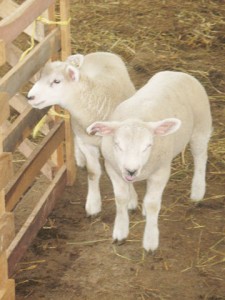The first batch of Texel sheep bred in Guyana are comparing favourably to their United Kingdom-bred counterparts.
At eight weeks, the majority of the lambs now weigh between 19 to 25 kilos, as compared to lambs born in the UK which weigh between 15 to 30 kilos at the same age. The sheep are also adapting admirably to local conditions, the British High Commission said in a press release. It noted that the lambs are showing the common characteristics for which the Texel breed is known–-strong muscles across the shoulders, back and hindquarters. The animals are also three-quarters the height of their Barbados Blackbelly mothers.

The sheep are the product of collaboration between the High Commission, the British Texel Sheep Society, the Ministry of Agriculture, the National Agricultural Re-search Institute (NARI) and the Guyana School of Agriculture (GSA), through a programme which aims to promote the commercialisation of sheep production in Guyana.
Under the programme, over 100 pure British Texel sheep embryos were implanted into 97 Barbados Blackbelly ewes at NARI, in order to develop a nucleus flock of pure-bred Texel sheep, to be used for breeding. “I am delighted that this programme is progressing as we hoped.
It reflects a productive partnership with the Ministry of Agriculture, NARI and the GSA. I believe such use of livestock genetics will help meet the Government of Guyana’s objective to diversify agriculture, which is critical to Guyana’s economic growth,” British High Commissioner to Guyana, Fraser Wheeler, was quoted as saying in the statement.
Meantime, the Texana, a crossbreed of the Barbados Blackbelly and Texel breeds, which is also being developed parallel to the pure Texel flocks are showing strong signs of taking on the stockiness of the Texel breed in combination with the hardiness and adaptability of the Barbados Blackbelly.
The lambs weigh from 14 to 20 kilos at eight weeks. The first flock of Texana was developed by artificially inseminating Barbados Blackbelly ewes with Texel semen.
Both the pure Texel and Texanas are increasing in weight by about 1.5 to 2 kilos per week as compared to the Barbados Blackbelly at 0.5 kilos a week.
Through cross-breeding, veterinarians of the British Texel Society and NARI hope to develop a unique breed that is ideally suited for local conditions but which retains the heavy carcass weight for which the Texel breed is known.
Apart from using genetics to develop a stockier strain of sheep, the programme aims at building capacity at NARI through new livestock management techniques and the provision of equipment.
The High Commission will also be providing assistance to help prevent and treat foot rot, a common disease among sheep. It will also provide a faecal monitoring pack, which is used to detect worms in sheep faeces, the statement added.




